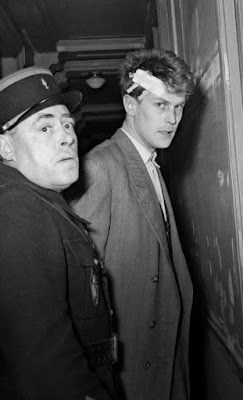France's highest constitutional body began examining a complaint Tuesday from a Frenchman seeking a law change to allow a pardon for his father who was executed in 1957 for killing a policeman in an armed robbery.
The law in France, which abolished capital punishment in 1981, prohibits the "legal rehabilitation" of convicts who were put to death.
Gérard Fesch approached the Constitutional Council for a change in law to allow for a posthumous reprieve for his father Jacques Fesch, who became a devout Christian in jail.
Making the request all the more extraordinary is that Gérard Fesch never knew his father, having been given up by his mother shortly after he was born and growing up in foster care.
Jacques Fesch was sentenced to death on April 6, 1957 and executed on October 1 of that year, aged 27.
During a half year on death row, he turned to religion in a dramatic repentance that senior French Catholics today deem worthy of beatification.
Patrice Spinosi, one of Gérard Fesch's lawyers, said it was "manifestly against the constitution" that a person executed could not be considered for rehabilitation when any other condemned criminal had a right to ask.
He said he expected a "strong" and "humane" decision from the court.
The Council is to give its ruling on February 28.
'Engraved in my heart'
The guillotine, a vertical, framed device that carries out executions by beheading, was the official means of capital punishment in France from the French Revolution until the country's last execution in September 1977.
"What I want is that history does not just remember the guillotine but that every person can repent and become better," Gérard Fesch, 65, told AFP about his campaign.
Gerard Fesch was 40 when he discovered who his father was, after a friend pointed out striking details in a magazine feature about Jacques Fesch's execution.
"I could have very well stopped there. But I saw that he was interested in my existence," he said, insisting that his father was "not a hooligan".
Just before being executed, Jacques Fesch wrote a letter to his "son Gérard" saying: "May he know that even though he could not be my son by law, he is in the flesh and his name is engraved into my heart."
His paternity was legally recognised in 2007, and the next year Gérard took Fesch as his surname.
The aim is not to "rejudge him" but to find a kind of a pardon and place "another stone in the fight against the death penalty," said Gérard Fesch.
Source: france24.com, Staff, February 5, 2020
⚑ | Report an error, an omission, a typo; suggest a story or a new angle to an existing story; submit a piece, a comment; recommend a resource; contact the webmaster, contact us:
deathpenaltynews@gmail.com.
Opposed to Capital Punishment? Help us keep this blog up and running! DONATE!
"One is absolutely sickened, not by the crimes that the wicked have committed,
but by the punishments that the good have inflicted." -- Oscar Wilde













